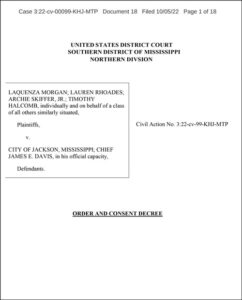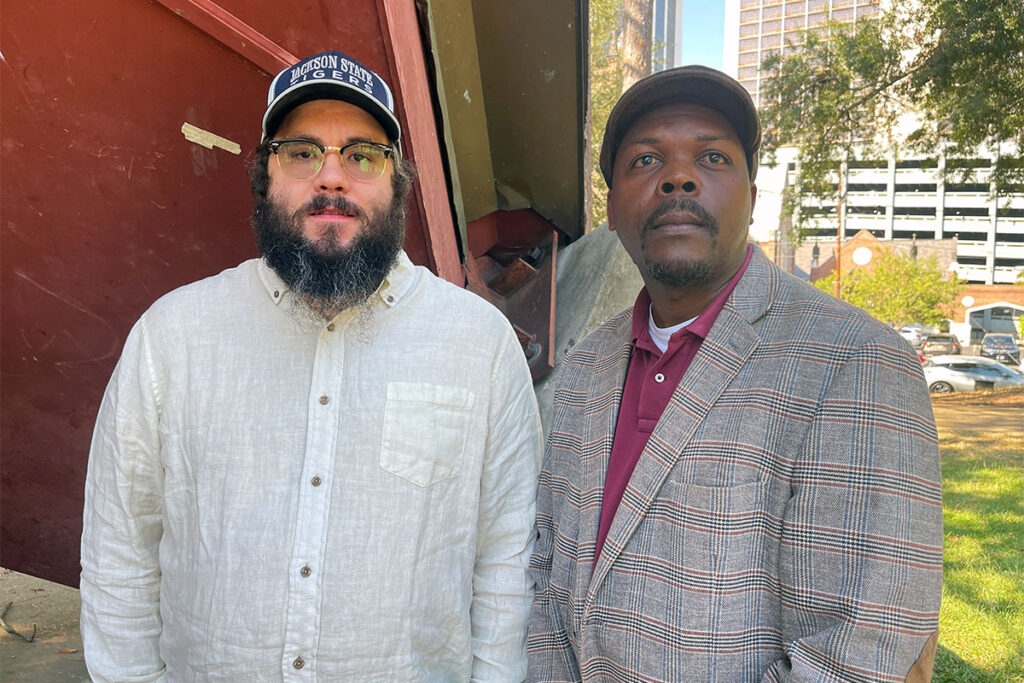A mother and three children walked home in the rain after Jackson Police officers impounded their car at a roadblock earlier this year. Multiple Jackson residents filed against the City in February 2022 over JPD’s roadblock practices, leading to a settlement this week. At a press conference on Friday, one of the plaintiffs, Archie Skiffer, Jr., said the agreement is a victory for people like that family, whose story he shared with reporters.
The Mississippi Center for Justice and the MacArthur Justice Center, whose attorneys represented the plaintiffs, said “the City of Jackson and Police Chief James E. Davis agreed to overhaul its roadblock policies and submit to federal court enforcement” in a statement on the settlement on Thursday.
“During our canvassing efforts in South Jackson, (we learned) about a mother of three who had her vehicle towed and was forced to walk home with her children in the rain,” Skiffer said during the press conference. He also told the story of “a single mother who was relying on DoorDash because she didn’t have insurance” and who as a result was “spending this exorbitant amount of money on delivery services just to avoid a ticket.”

On Friday, City of Jackson Communications Director Melissa F. Payne told the Mississippi Free Press that “the City has no comment at this time” when asked for a response to the settlement.
Five Jackson residents filed the class-action lawsuit against the City of Jackson and Police Chief James E. Davis in February, alleging that the policies resulted in the “disproportionate placement of vehicular roadblocks, or checkpoints, in majority-Black and low-income neighborhoods.” The lawsuit pointed specifically to a roadblock program known as “Ticket, Arrest, and Tow,” also known as TAT. U.S. Southern Mississippi District Court Judge Kristi H. Johnson signed the settlement agreement in the case on Oct. 5, 2022.
“I celebrate this victory with those two individuals and their households, and hopefully, this will reduce further harm, although the harm has already been caused to those two households,” Skiffer said Friday. “But nonetheless, going forward, we have instruments in place that can hold JPD accountable moving forward.”
Wu: Roadblocks ‘Divert Family Dollars’
The settlement limits JPD roadblocks to specific conditions, the Mississippi Center for Justice Impact Litigation Deputy Director Paloma Wu said at the press event.
“Under the settlement, the reasons they can set up checkpoints are: unusual incidents of alcohol, drug, or other traffic-related crashes at particular locations; alcohol or drug-impaired driving violations at a particular location; an unusual number of vehicle crashes at a particular location; other documented alcohol, drug, or traffic incidents in a particular location or location of establishments that sell liquor by the drink; a special holiday or other occasions where people are typically looking for whether people are impaired on the road,” she said.
Roadblocks must also be distributed across beats, which are precinct subdivisions, and “safety checkpoints may be placed in any beat, but no beat may be subject to a checkpoint twice before all beats have been beaten once,” according to the settlement.
Wu said the purpose of mandating the roadblock spread “is to ensure that majority white, high-income neighborhoods are not policed differently with regards to roadblocks as majority Black and low-income neighborhoods.” She praised the City of Jackson and the police department’s leaders for working “in good faith” for a long time to reach the agreement, even though it fell short of the plaintiffs’ ultimate goal of getting rid of all roadblocks; Wu said the data does not support their effectiveness in crime prevention and that they worsen poverty instead.
“Draconian enforcement of misdemeanor driving-related offenses through unnecessary arrests and vehicle impounds at roadblocks for infractions like having an expired registration wastes precious police resources needed for responding to violent crime and makes poor residents poorer without making them safer,” she said. “People unnecessarily punished with arrest and towing for minor traffic-related offenses make struggling residents lose jobs, split up parents and kids, impound the family car needed to drive children to school and breadwinners to work, divert family dollars needed for food and light bills to paying bail bondsmen and impound fees.”

“It increases the likelihood that residents unnecessarily jailed in the first instance at roadblocks will then return to jail,” Wu added. “We have good data on this that making mass arrests for poverty-related infractions in neighborhoods already struggling with violent crime makes communities less safe in the long run.
“Ultimately, this settlement incorporates sweeping and necessary changes to the city’s roadblock policy that address the plaintiff’s Fourth Amendment concerns and which reduce the harm inherent to the use of roadblocks as a policing tool.”
‘Critical Victory for the Jackson Community’
In the Thursday press release announcing the settlement, Mississippi Center for Justice President and CEO Vangela M. Wade described the settlement as a “critical victory for the Jackson community.”
“Checkpoints—which don’t fight crime—are costly and wreak havoc on disproportionately impacted poor and Black communities,” she said. “Under this settlement, the harmful impacts of checkpoints will be greatly curbed.”

The press release also said, “The settlement requires a new policy from the Jackson Police Department that says roadblocks can’t be used to stop crime in general.”
“The lawsuit argued that TAT roadblocks were unreasonable searches and seizures in violation of the Fourth Amendment of the U.S. Constitution,” the press release added. “Jackson’s Mayor and Chief Davis stated publicly that TAT roadblocks were being used for general crime control purposes, but the United States Supreme Court has said such use of roadblocks is similar to the police routinely entering people’s homes to search for evidence of criminal behavior and violates the Fourth Amendment.”
Wu said on Friday that her organization has evidence that “systems of roadblocks (that) disproportionately impact majority-black and low-income neighborhoods in Mississippi cities is a huge issue across the state.”
“So roadblocks divert critical police resources away from addressing violent crimes, and roadblocks can’t be constitutionally used to try to thwart crime or find wrongdoers because, in America, you cannot be pulled over while driving without the police having an individualized reason to believe that you may have committed a crime,” she said.
“Roadblocks are a rare exception to the general constitutional rule that police require probable cause or individualized suspicion to detain you. Under this rare roadblock exception in the Fourth Amendment, your detention at a roadblock can’t be used to sniff out wrongdoing. Your detention can only be used to ensure that the driver should be driving. Unsurprisingly, roadblocks both cannot constitutionally and do not address violent crime.”
At the press conference, plaintiff Timothy Halcomb, who resides in South Jackson, described his experience going through a roadblock near his neighborhood in February. He expressed misgivings about using violent crime prevention as a pretext for setting up the roadblocks, describing it as “an attempt to criminalize the poor.”
“We live in a poor neighborhood, (but) that doesn’t make us criminals,” Halcomb said Friday. “Most of the people that I saw on the roadblock near me were grandmothers, mothers, fathers, people coming home, going to work.”

Wu said people who are arrested at roadblocks “must be given the opportunity to call a person with a valid license to pick up their car in lieu of having it towed, to legally park their car in lieu of having it towed,” and “to call a towing company of their choice.”
“If they choose to use a JPD contracted towing company, those fees must be transparent and capped, and there should be retrieval allowed within 24 hours,” she said.
“For people ticketed or arrested, police are now required to provide a handout with necessary information about how to contact the clerk of the court for options regarding their ticket, how to seek license reinstatement through the Department of Public Safety, how to retrieve their car from towing companies, and it will list what the towing and storage fees are for JPD contracted towing companies,” the attorney added.
‘It Caused Very Real Harm’
Though the settlement agreement indicated that it will last for a four-year period, which the court could extend if the City and JPD do not substantially comply, Wu said “the City should be commended for its integrity and allowing the court to keep the parties accountable to this agreement for the next four years through a consent decree.”
The settlement outlined what the checkpoint policy of the City shall be, including the submission of checkpoint data to plaintiffs every quarter, which the attorneys promised to publish for the public.
The Jackson Police Department will also distribute “Know Your Rights” flyers to people ticketed or arrested at roadblocks. While police officers can give out citations, the checkpoints will not be used to run outstanding warrants, and the consent decree prohibits arrests for car insurance violations and suspended licenses for non-traffic-related violations. “These offenses shall not be a basis for checking for outstanding warrants,” it says.

Mississippi Alliance for Public Safety organizer Lea Campbell said that the Ticket Arrest Tow program “as originally conceived and implemented by JPD was, in fact, a harmful barrier to public safety, not an effective tool to reduce crime or improve road safety.”
The Mississippi Alliance for Public Safety worked with the plaintiffs and attorneys on the case.
“The data and the stories that we collected showed that the initiative clearly targeted predominantly Black neighborhoods and low-income neighborhoods,” Campbell added. “It caused very real harm to residents and families already struggling to get by from day to day.”
“We have a policy that balances the interests of JPD in ensuring road safety and members of the community who deserve to be treated with dignity and with respect as they go about their day-to-day lives,” she added.










